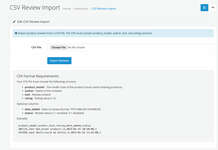In this opencart guide, we are showing you the OCMOD Modification System of Opencart 2.3 with an example of the “Show all products module” eCommerce. Opencart 4 OCMOD documentation
Things to take care of while making an OCMOD file:
- File extension must be either .ocmod.zip or .ocmod.xml.
- Upload from the admin section, Admin>>Extensions >> Extension Installer, Upload the .xomod.zip or .ocmod.xml file from here.
Now go to the following link and download the “Display all Products” module Download shows all products module You will find the following OCMOD example which shows how to show “All Products” links at the top menu bar.

For example:
<modification> <version>OpenCart Version 2.2</version> <vqmver>2.0.0</vqmver> <author>Rupak Nepali</author> <code>List_all_Products</code> <file name="catalog/view/theme/*/template/common/header.tpl" error="skip"> <operation> <search position="after"><![CDATA[ <ul class="nav navbar-nav"> ]]></search> <add><![CDATA[ <li><a href="index.php?route=product/allproduct">All Products</a></li> ]]></add> </operation> </file> </modification>
More details at https://github.com/opencart/opencart/wiki/Modification-System OCMOD is a system that allows store owners to be able to modify their store by uploading a compressed file that contains XML, SQL, and PHP files. If an OCMOD is developed correctly it can modify how a user’s OpenCart store works without changing any of the core files. This means that if a modification is removed none of the original OpenCart files need to be restored or fixed.
OCMOD Files
OCMOD files can be uploaded via the opencart admin under Extensions / Extension Installer For an OCMOD file to be uploaded the file extension must be either .ocmod.zip or .ocmod.xml. This is to avoid none of the OCMOD files from being uploaded to a store user admin.
File Structure
Example file structure for OCMOD compressed files.
- upload
- install.sql
- install.php
- install.xml
upload
All files under this directory will be uploaded to the directory of your OpenCart installation.
install.sql
Add any create, drop, insert, and update SQL queries here. Make sure each query ends with ;
install.php
If the modification requires any custom PHP code.
install.xml
The XML modification file. You can view the documentation for this system below.
XML
This is the file that creates a virtual copy of any files that require changes. Use this system instead of overwriting any default installation files. Multiple modifications can be applied to the same file. Example OCMOD file:
<?xml version="1.0" encoding="utf-8"?>
<modification>
<name>Modification Default</name>
<version>1.0</version>
<author>OpenCart Ltd</author>
<link>http://www.opencart.com</link>
<file path="catalog/controller/common/home.php">
<operation>
<search><![CDATA[
$data['column_left'] = $this->load->controller('common/column_left');
]]></search>
<add position="replace"><![CDATA[
test123
]]></add>
</operation>
</file>
</modification>
Tags
File
You can set multiple file locations by spiting up the file locations using commas. The modification system uses the PHP function glob. http://hk1.php.net/manual/en/function.glob.php Example: Direct file path.
<file path="catalog/controller/common/home.php">
Using braces allows for selecting multiple files and not having to repeat the code operation multiple times.
<file path="system/engine/action.php|system/engine/loader.php|system/library/config.php|system/library/language.php">
also allows braces
<file path="system/{engine,library}/{action,loader,config,language}*.php">
please note that all file paths must start with either admin, catalog, or system. you can also use wildcard *
Search
Search code Allowed Attributes
- trim=”(true|false)”
- regex=”(true|false)”
- index=”(number)”
Example:
<?xml version="1.0" encoding="utf-8"?>
<modification>
<name>Modification Default</name>
<version>1.0</version>
<author>OpenCart Ltd</author>
<link>http://www.opencart.com</link>
<file path="catalog/controller/common/home.php">
<operation>
<search trim="true|false" index="1"><![CDATA[
$data['column_left'] = $this->load->controller('common/column_left');
]]></search>
<add position="replace" offset="1"><![CDATA[
test123
]]></add>
</operation>
</file>
</modification>
Add
The code to replace the search with. Allowed Attributes
- trim=”(true|false)”
- position=”(Replace|Before|After)”
- offset=”(number)”
(note position can not be used if regex is set to true in the search attribute). Example
<?xml version="1.0" encoding="utf-8"?>
<modification>
<name>Modification Default</name>
<version>1.0</version>
<author>OpenCart Ltd</author>
<link>http://www.opencart.com</link>
<file path="catalog/controller/common/home.php">
<operation>
<search trim="true|false"><![CDATA[
$data['column_left'] = $this->load->controller('common/column_left');
]]></search>
<add position="Replace|Before|After" trim="true|false" offset="2"><![CDATA[
test123
]]></add>
</operation>
</file>
</modification>
Regex
Allowed Attributes
- limit=”(number)”
Example:
<?xml version="1.0" encoding="utf-8"?>
<modification>
<name>Regex Example</name>
<version>1.0</version>
<author>OpenCart Ltd</author>
<link>http://www.opencart.com</link>
<file path="system/{engine,library}/{action,loader,config,language}*.php">
<operation>
<search regex="true" limit="1"><![CDATA[
~(require|include)(_once)?\(([^)]+)~
]]></search>
<add><![CDATA[
$1$2(modification($3)
]]></add>
</operation>
</file>
</modification>
If you use regex you can not use attributes position, trim or offset as these are handled by the regular expression code you write. The limit attribute is still available. If, for example, you want to change the 3rd ‘foo’ to ‘bar’ on the following line:
lorem ifoopsum foo lor foor ipsum foo dolor foo
^1 ^2 ^3 ^4 ^5Run:
s/\(.\{-}\zsfoo\)\{3}/bar/Result:
lorem ifoopsum foo lor barr ipsum foo dolor foo
^1 ^2 ^3=bar ^4 ^5You can find more information about the regular expression PHP function OCMOD uses can be found here: http://hk2.php.net/manual/en/function.preg-replace.php More information about regular expression can be found here: http://www.regular-expressions.info






